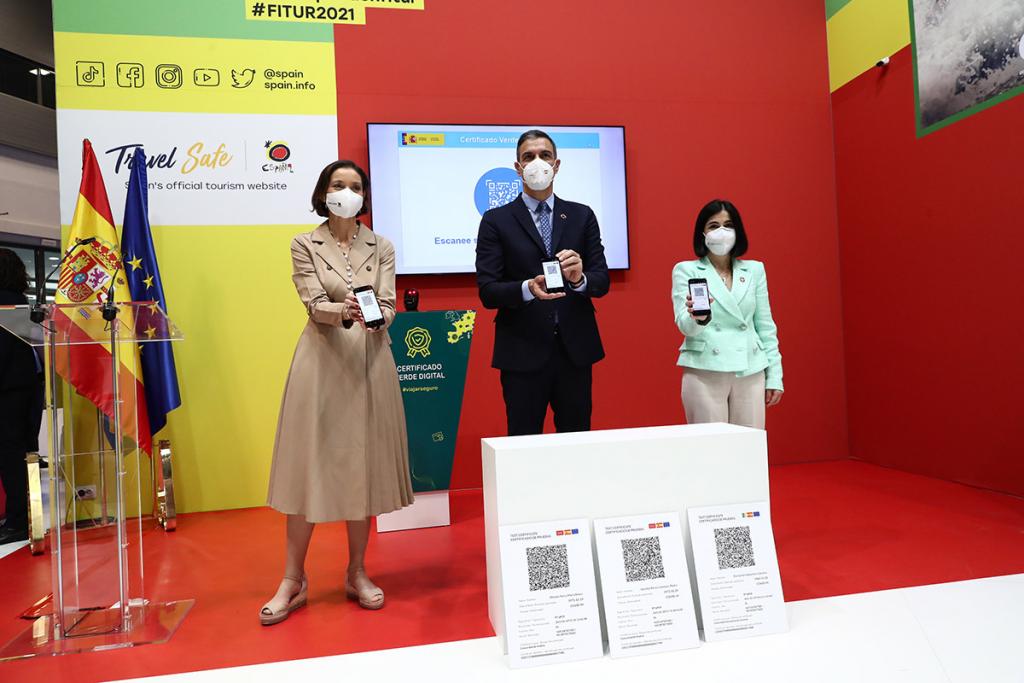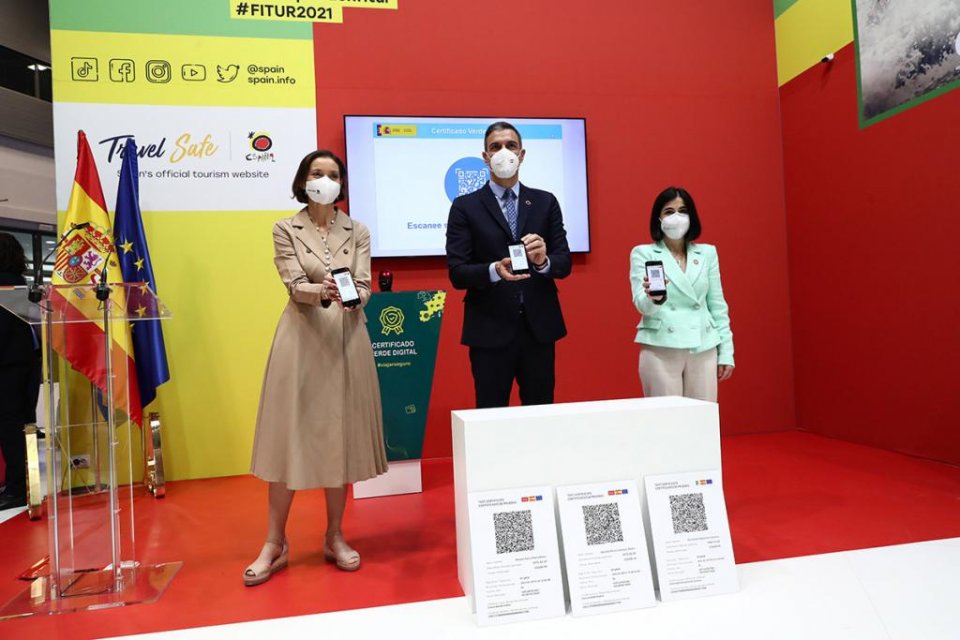Latest: Coronavirus in Spain figures (18 June)
Spain has started to issue the EU Digital Covid Certificate to all citizens in Spain who apply for it, becoming one of the first European countries capable of issuing and recognising the certificate. It is 20 days earlier than when it becomes mandatory – set for 1 July – which is the date set by the European Regulation for ‘the rights of citizens and the obligation of member States’.
The EU Digital Covid Certificate is to be used as digital proof that a person has either:
- been fully vaccinated against Covid-19
- received a negative test result,
- or recovered from Covid-19
The European Commission has stated that: ‘EU Certificates can be issued and used in all EU Member States to facilitate free movement during the Covid-19 pandemic. All EU citizens and their family members, as well as non-EU nationals legally staying or residing in the Member States and who have the right to travel to other Member States, would be eligible to receive such certificates free of charge.’
The Commission has also stated that, ‘the EU certificate only includes a minimum set of information necessary to confirm and verify the holder’s vaccination, testing or recovery status.’
The key features of the certificate are:
- Digital and/or paper format
- with QR code
- free of charge
- in national language and English
- safe and secure
- valid in all EU countries
In Spain, it will be used progressively and on a trial basis throughout June, although the certificates issued will be valid from the outset. This week, most regional governments in Spain will start issuing digital certificates for citizens to verify having been fully vaccinated against Covid-19 or having recovered from the disease.
In the coming days and weeks, the regional governments will offer more and more functions to the certificate with the aim of being able to issue both electronic and hard-copy certificates from 1 July, verifying the three situations: vaccination, recovery and negative results of a diagnostic test.
Spain’s national and regional authorities are in charge of issuing the certificates. It could, for example, be issued by test centres or regional health authorities, or directly via a region’s eHealth portal. Any citizen who requests the certificate via the Spanish Ministry of Health website must be able to prove that they have been vaccinated or that they have overcome the disease. For further information, here is the current link set up (in Spanish) on the central ministry’s website to apply for a certificate: https://cvd.sanidad.gob.es/cvdcovid/cvdcovid-formulario/index.xhtml. We recommend our readers to contact their regional health portals.
The EU Digital Covid Certificate is completely free of charge and can be obtained both in electronic and paper formats. In both cases, each certificate includes a QR code that makes it easy to read.
Without this certificate, it will be possible to travel within the EU in compliance with the health requirements, but the process of entering the country will be slower and additional measures, such as testing and quarantine, may be put in place.
‘Thanks to the work of the professionals of the National Health System, both the [Health] Ministry and the regional governments, it will be possible that in just over a month, millions of Spaniards will be able to have this certificate to facilitate their international mobility,’ said Alfredo González Gómez, Spain’s Secretary General for Digital Health, Information and Innovation. He added: ‘This demonstrates both the enormous potential of new technologies applied to health and the excellent collaboration that exists in the health sector between the Government of Spain and the regional governments’.
Here are further FAQ regarding the EU Digital Covid Certificate:
How will the certificate work?
- The EU Digital Covid Certificate contains a QR code with a digital signature to protect it against falsification.
- When the certificate is checked, the QR code is scanned and the signature verified.
- Each issuing body (e.g. a hospital, a test centre, a health authority) has its own digital signature key. All of these are stored in a secure database in each country.
- The European Commission has built a gateway through which all certificate signatures can be verified across the EU. The personal data of the certificate holder does not pass through the gateway, as this is not necessary to verify the digital signature. The European Commission also helped Member States to develop national software and apps to issue, store and verify certificates and supported them in the necessary tests to on-board the gateway.
How will citizens get the certificate?
- EU Member States’ authorities are in charge of issuing the certificate. It could, for example, be issued by test centres or health authorities, or directly via an eHealth portal.
- The digital version can be stored on a mobile device. Citizens can also request a paper version. Both will have a QR code that contains essential information, as well as a digital signature to make sure the certificate is authentic.
- Member States have agreed on a common design that can be used for the electronic and paper versions to facilitate the recognition.
How will it help free movement?
- The EU Digital Covid Certificate will be accepted in all EU Member States. It will help to ensure that restrictions currently in place can be lifted in a coordinated manner.
- When travelling, the EU Digital Covid Certificate holder should in principle be exempted from free movement restrictions: Member States should refrain from imposing additional travel restrictions on the holders of an EU Digital Covid Certificate, unless they are necessary and proportionate to safeguard public health.
- In such a case – for instance as a reaction to new variants of concern – that Member State would have to notify the Commission and all other Member States and justify this decision.
Will citizens who are not yet vaccinated be able to travel to another EU country?
- Yes. The EU Digital Covid Certificate should facilitate free movement inside the EU. It will not be a pre-condition to free movement, which is a fundamental right in the EU.
- The EU Digital Covid Certificate will also prove the results of testing, which is often required under applicable public health restrictions. The certificate is an opportunity for Member States to adjust the existing restrictions on public health grounds. The currently applicable recommendation on coordinating free movement restrictions in the EU will also be amended by mid-June with a view to the holiday season.

New rules for entering Spain since 7 June
Since Monday 7 June, all travellers from outside the European Union and Schengen Zone can visit Spain, providing they have a certificate to show they have been fully vaccinated against Covid-19 and that the second dose was received at least 14 days before travelling (or the first and only dose if vaccinated with Janssen).
Meanwhile, non-vaccinated Europeans — who were already allowed to enter Spain with a negative PCR test taken within 72 hours — since 7 June are also able to take a cheaper antigen test instead. Since Monday 24 May, Spain officially lifted restrictions for UK travellers to allow non-essential travel without quarantine or the need to provide any test, although a health declaration form is required. However, Spain still remains on the UKgovernment’s updated ‘amber’ list of countries after the latest review of travel destinations.
The new measures were finally published in Spain’s Boletín Oficial del Estado (BOE) on Saturday 5 June. The Spanish Tourism Ministry has also detailed (in English) the new measures in a 3 page document here.
For further details, please see our separate report: Spain open to all fully vaccinated non-EU travellers, and antigen tests accepted for EU
Sign up for the FREE Weekly Newsletter from Spain in English.
Please support Spain in English with a donation.
Click here to get your business activity or services listed on our DIRECTORY.
Click here for further details on how to ADVERTISE with us.




2 comments
Been trying to get my certificate from the Andalucía App (and website) eveer since my vaccination but it says my details are incorrect. They are not and are identical to the printout given by my Central Salud clinic. I have read so many “feedbacks” that this doesn’t work so I am not the only one. Some are lucky, my wife for instance, got hers without problem but others are not so lucky. Its a very bad App if people who need a certificate (are entitled to one!) cannot get one because of a very buggy app.
I find your weekly newsletter very informative and helpful,
Thank you.